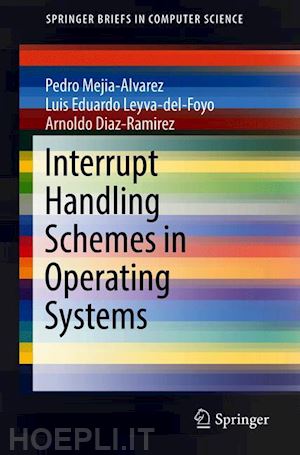
Questo prodotto usufruisce delle SPEDIZIONI GRATIS
selezionando l'opzione Corriere Veloce in fase di ordine.
Pagabile anche con Carta della cultura giovani e del merito, 18App Bonus Cultura e Carta del Docente
In this book, the interrupt handling models used by several operating systems are introduced and compared.
We begin with an analysis of the classical interrupt management model used by Unix, followed by the schemes used by modern networked environments.
We highlight the key challenges of each of these models and how these have been solved by modern operating systems and the research community. Then we analyze the architectures used for general purpose and embedded real-time operating systems.
1. Interrupt Mechanism
1.1.Introduction
1.2.Overview of the Hardware and Software Interrupts
1.3. Hardware of Interrupts in PC Compatible Systems
1.4. Interrupt Acknowledge Cycle
1.5. Interrupt Control Levels
1.6. Interrupt Handling Software1.5.1. Interrupt Service Routine
1.5.2. Interrupt Handling Initialization
1.5.3. Restoring of the Interrupt Handling System
1.7.Interrupt Management Model used by Traditional Operating Systems1.7.1. Priority Scheme
1.7.2. Mutual Exclusion Synchronization between Asynchronous Activities
2. Interrupt Handling in Classic Operating Systems
2.1.Introduction
2.2.UNIX Operating System
2.2.1. Non-Premptable Unix Kernel
2.2.2. Conditional Synchronization inside the Kernel
2.2.3. Mutual Exclusion Synchronization between Top and Bottom Halves
2.3.Networked Operating System2.3.1. Interrupt Handling in Windows NT
2.3.2. Interrupt Handling in Linux
3. Handling of Interrupts as Threads
3.1.Introduction
3.2.Interrupts as IPC (Microkernel Architecture)3.3.Interrupt Handling at User Level
3.4.Model of Interrupts as Kernel Threads in Solaris 2.0
3.5.Interrupts Handled as Threads in Real Time Linux
4. Treatment of Interrupts in Embedded and Real Time Systems
4.1.Introduction
4.2.Scheduling the Event Treatment4.3.Schedulable and Non-Schedulable Entities
4.4.Mutual Interference in Traditional Models in Real-Time Systems
4.4.1. Priority Interference
4.4.2. Interrupt Latency Interference4.4.3. Mutual Exclusion Interference
4.4.4. Sequencing Interference
4.5.Other Issues in Interrupt Handling
4.5.1. Interrupt Elimination
4.5.2. Incorporation of the Interrupt Cost in the feasibility Analysis
4.5.3. Interrupt Handling Overload
5. Interrupt Handling Architectures
5.1.Introduction
5.2.Unified Interrupt Architecture
5.3.Segmented Manager Architecture
5.4.Thread-Level Interrupts Handling in Real-Time Systems5.5.Integrated Mechanisms for Tasks and Interrupt Handling
References
Pedro Mejia-Alvarez received the BS degree in computer systems engineering from ITESM, Queretaro, Mexico, in 1985 and the PhD degree in informatics from the Universidad Politecnica de Madrid, Spain, in 1995. He has been a Professor in the Department of Computer Science at CINVESTAV-IPN Mexico since 1997. In 1999, he held a research faculty position in the Department of Computer Science at the University of Pittsburgh and, in 2000, a visiting assistant professor position in the Department of Information Sciences and Telecommunications at the University of Pittsburgh. His main research interests are real-time systems scheduling, low-power computing, adaptive fault tolerance, and software engineering. He is member of the IEEE Computer Society.
Luis Eduardo Leyva receive the BS degree in Automatic Control Engineering from Instituto Superior Politécnico “Julio Antonio Mella”, Universidad de Oriente, Santiago de Cuba (1989). The Msc. in Computer Science, from Centro de Investigacion en Computacion, Instituto Politecnico Nacional, Mexico,(2000), and PhD in Electrical Engineering from CINVESTAV-IPN, Mexico (2007). He has been a Professor in the Department of Computer Science at Universidad Autonoma Metropolitana, Unidad Cuajimalpa, since 2008. His research interests are Real-Time and Embedded Systems, Distributed Systems and Software Engineering.
Arnoldo Díaz-Ramirez is a research professor in the department of Computer Systems at Tecnologico Nacional de Mexico/Instituto Tecnologico de Mexicali. He received the BS degree in computer sciences from Cetys University, Mexicali, Mexico, and the Masters degree in computer sciences from the same university. He received the PhD degree in computer sciences from Universitat Politecnica de Valencia, Spain, in 2006. His research interests include real-time systems, Internet of Things, wireless sensor networks, and ubiquiotous computing. He is member of the IEEE Computer Society.











Il sito utilizza cookie ed altri strumenti di tracciamento che raccolgono informazioni dal dispositivo dell’utente. Oltre ai cookie tecnici ed analitici aggregati, strettamente necessari per il funzionamento di questo sito web, previo consenso dell’utente possono essere installati cookie di profilazione e marketing e cookie dei social media. Cliccando su “Accetto tutti i cookie” saranno attivate tutte le categorie di cookie. Per accettare solo deterninate categorie di cookie, cliccare invece su “Impostazioni cookie”. Chiudendo il banner o continuando a navigare saranno installati solo cookie tecnici. Per maggiori dettagli, consultare la Cookie Policy.